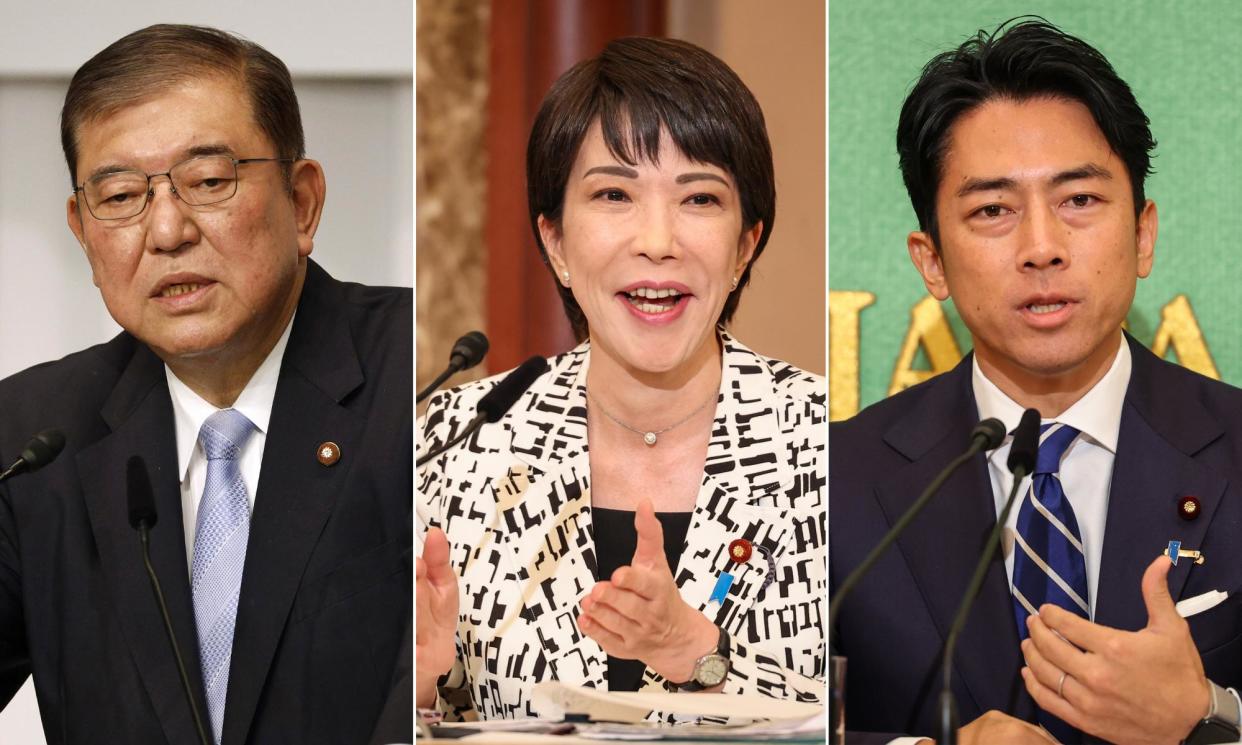Who will Japan’s next PM be? A policy wonk, ultra-conservative or surfer making the climate fight ‘sexy’

With just 10 days to go before Japan’s governing party elects a new leader – who will automatically become prime minister – the contest is still too close to call.
Among the frontrunners are Shigeru Ishiba, a model aircraft enthusiast and security policy wonk about to embark on his “final battle”, and Shinjiro Koizumi, the youthful, photogenic son of a former prime minister who once insisted the fight against climate change could be “sexy” and “fun”. The race has been complicated by a new poll in which ruling Liberal Democratic party (LDP) supporters named Sanae Takaichi, the ultra-conservative economic security minister, as their preferred choice.
The current prime minister, Fumio Kishida, blew open the race to lead the LDP – a conservative political powerhouse that has governed almost unchallenged for seven decades – with his surprise decision not to run in the leadership race on 27 September.
Related: Japan PM Fumio Kishida announces he will step down in September
Citing the need for new blood after damaging political and financial scandals, and stubbornly low personal approval ratings, Kishida warned that his successor must lead a “new LDP”.
Under Japan’s parliamentary system, the party’s new president, who will be chosen from a record nine candidates, will automatically become prime minister when he – or she – is approved by the LDP-dominated Diet.
On Monday, a poll by the Kyodo news agency showed that 63-year-old Takaichi – who played drums in a rock band as a teenager – was viewed by 27.7% of LDP supporters as most suitable to be Japan’s next prime minister, although doubts remain over her ability to garner votes among her lawmaker colleagues.
The poll, in which Ishiba received 23.7% support and Koizumi 19.1%, indicates that the leadership vote will have to go to a decisive second round.
Koizumi has struggled to convert his popularity with voters into a credible bid to become leader of the world’s fourth-biggest economy. Recent polls suggest this attempt, too, could end in failure at the hands of Ishiba, 67, who is attempting to become LDP head at the fifth – and, he says, final – time of asking.
An earlier poll by Nikkei financial newspaper and broadcaster TV Tokyo put support for Ishiba at 26%, followed by the 43-year-old Koizumi at 20%, with Takaichi, at 16%.
Each of the LDP’s 367 lawmakers will cast a vote in the first round, while an equal number of votes will be distributed based on the preferences of just over 1 million grassroots members who must cast their votes by 26 September.
In the unlikely event that one candidate secures a simple majority in the first round, he or she will become party leader. But in the absence of a runaway favourite, the two candidates with the most votes will compete in a second round, with each LDP lawmaker getting one vote and membership’s share dropping to 47 votes, one for each of Japan’s prefectures.
The old guard v the new
Despite his lack of success in four previous leadership races, Ishiba is seen as a safe pair of hands able to steer the LDP out of stormy waters, although some analysts believe only victory for Koizumi would prove to voters that the LDP is serious about addressing the fallout from a damaging fundraising scandal.
Koizumi, a keen surfer who graduated with a Master’s degree in political science from Columbia University, can offer “a nebulous promise of generational change and modernisation of the ruling LDP,” said James Brady, vice-president of the political risk advisory firm Teneo.
While Ishiba could outperform his rival among rank-and-file members, “Koizumi is likely to receive significantly more support from parliamentary colleagues, giving him a real chance of coming top in the first round”, Brady added.
What the softly spoken Ishiba, a member of Japan’s tiny Christian population, lacks in charisma, he makes up for in experience. A strong backer of Taiwanese democracy, he has served as defence minister and supports the creation of an Asian “Nato” to counter security threats from China and North Korea.
In some ways, though, Koizumi’s candidacy is a continuation of the status quo. As one of a glut of “hereditary politicians” in Japan’s parliament, much of his public profile rests on the legacy of his father, the silver-haired, Elvis-impersonating Junichiro Koizumi, Japan’s prime minister from 2001-6.
The younger Koizumi rose steadily through the LDP ranks, serving as environment minister a decade after he inherited his father’s constituency in Kanagawa prefecture in 2009 – the fourth-generation member of a political dynasty whose involvement in Japanese public life stretches back more than a century.
Koizumi immediately made waves, telling a UN summit in that in “tackling a big-scale issue like climate change, it’s got to be fun, it’s got to be cool, and it’s got to be sexy, too” – a choice of words some described as frivolous.
After his marriage to the TV presenter Christel Takigawa, he became the first Japanese cabinet minister to take paternity leave – albeit a measly two weeks – after the birth of their first child in 2020.
Koizumi has displayed similarly “modern” instincts elsewhere. He supports legislation to permit married couples to use separate surnames and to allow women to become reigning empresses, a move also backed by Ishiba.
While his immediate future will be decided by party colleagues and members, Koizumi, who would become Japan’s youngest prime minister since the war, has said he will immediately seek a popular mandate by calling a snap election. “After the money scandal, we won’t get anywhere with our policies unless we face the people’s judgment first,” he said.
Agencies contributed reporting.


